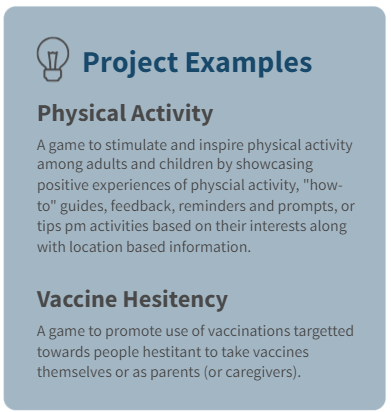Winner - "Innovation Game": Applying Serious Game Design
Course Summary:
The course focusses on game design and innovative processes as tools to improve healthcare services and enhance self-management of health. By introducing methods and terminology of innovation and entrepreneurship, the course assists students in applying innovative thinking to a problem, generating ideas, outlining goals, and finding creative solutions of value for the end-user.
As a starting point, students examine problems defined by society. Collaborating with representatives from the healthcare industry and academia, they work towards the ambition of proposing innovative solutions for a healthier life. Throughout the course, students develop games to promote changes in healthcare, self-management, learning, and/or behaviour.
Course Design
- International & Interdisciplinary perspectives
The core staff have different academic backgrounds, e.g. psychology, teaching, game design, IT management, business development, and come from different countries and different academic backgrounds. The students too represent different disciplines and nationalities.
- Active teaching methodologies
The course is built on a challenge-, and problem-based methodology. Students are encouraged to autonomously find solutions to challenges that are presented by external stakeholders. During the entire process, students are coached by the teaching team on aspects like goal-setting, assuming roles during group work and working within set time-frames and deadlines. Following this trajectory closely, the teaching team helps students overcome hurdles in the process of designing of the game.
Students are introduced to the Design Thinking methodology where they use the steps in the framework of empathize, define, ideate, prototype and test, starting with a “need” to arrive at a working prototype or a “product”.
- Formative Assessments and Feedback
The course assesses students in a summative and formative manner during several junctures in the course.
Even before the course starts, students are assessed using multiple choice questions (with automated feedback) and on a written essay on Mechanics-Dynamics-Aesthetics (MDA) framework in Game Design. Students receive individual feedback on their essays. The assessment method serves to kickstart their learning process.
During the student’s group work, they get formative feedback from the teaching team who visit their groups and observe their progress.
Another crucial element of feedback is from the game designers and from potential end-users who comment on the feasibility of the application itself.
Finally, the students also receive feedback on their oral presentations and can as well reflect and offer feedback on the groupwork itself.
In the following video, you can watch course designers elaborate on their motivations, processes and experiences of implementing the course.
Contact:
Prof. Dr. Eric Olsson, Course Leader
